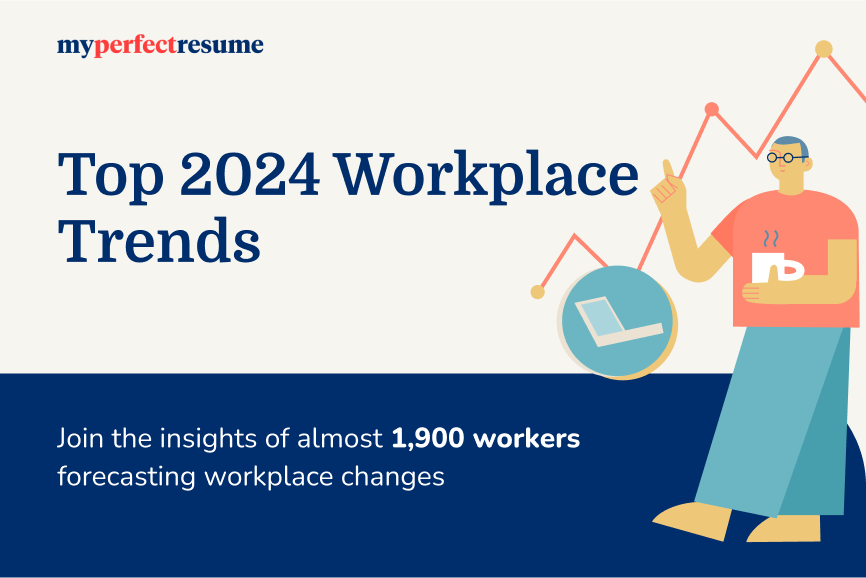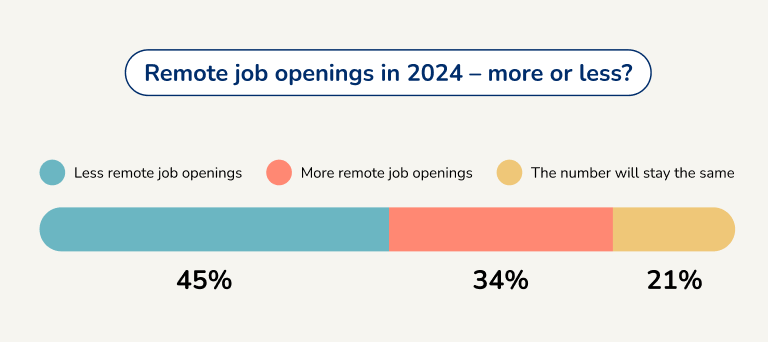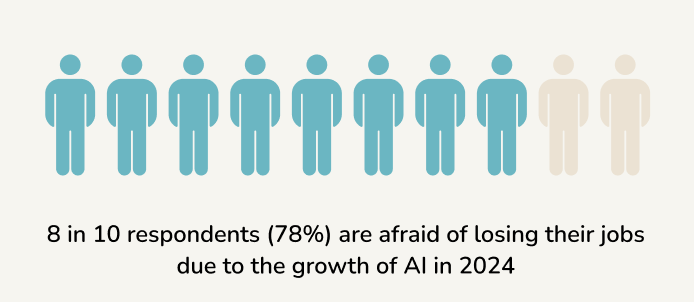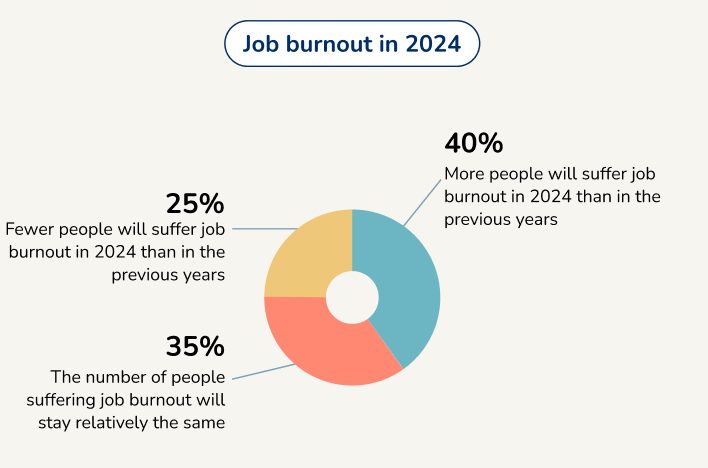2024 Workplace Trends Survey Finds 85% Are Worried They Will Lose Their Jobs in 2024
MyPerfectResume.com [May 22, 2024],
[https://www.myperfectresume.com/career-center/careers/basics/2024-workplace]

Our customers have been hired at: *Foot Note
Table of Contents
Get started with MyPerfectResume today!
- Build a resume on any device
- Pick an ATS-friendly template
- Tailor with AI copy suggestions
What's in store for workers and the labor market for 2024?
Between October 18–19, 2023, MyPerfectResume surveyed nearly 1,900 U.S.-based workers and asked them to share their forecasts and trends for 2024.
The study provided valuable insights into job opening trends, job burnout, and the future of remote work.
Moreover, if you harbor concerns about a potential 2024 recession or job displacement due to AI, rest assured we've got insights to share.
Without further ado, here’s what our 2024 Workplace Trends Survey revealed!
Are you looking for remote jobs? Our sister company, FlexJobs, updates listings daily with verified remote jobs. Find full-time and part-time remote jobs with FlexJobs.
Prepare for Recession, Competition and Job Cuts
MyPerfectResume's extensive findings unequivocally mirror the prevailing negative sentiment emanating from job seekers as we stand on the cusp of 2024.
Their concerns relate to various aspects of the labor market.
These expectations are the cautious outlook held by many individuals, highlighting their concerns regarding the stability and overall health of the country's economy.
However, it's essential to recognize that economic forecasts are influenced by a multitude of factors. While the concerns of those surveyed are valid, they also present an opportunity for mental strength and adaptability.
Hardly optimistic news for job seekers here: 61% expect recruitment processes to be longer in 2024. Explore our HR and recruitment report for additional insights into the latest hiring trends.
Our respondents were also asked about their thoughts on work models, especially remote work. Nearly half (45%) predict a reduction in remote job openings.
Staying with the subject of work models, almost 9 in 10 people (87%) believe more companies will introduce return-to-office (RTO) policies in 2024 than in 2023.
Consider this a positive trend. The resurgence of office work doesn't confine you to the cubicle but paves the way for a powerful blend of in-office collaboration and home-based productivity.
Still, more than returning to offices, people fear AI and new technologies.
8 in 10 respondents (78%) fear losing their jobs due to the growth of AI in 2024.
Are these concerns justified? At this point, most technologies need humans to operate effectively, so expect close cooperation. We recommend checking out the best AI resume builders if you plan to update your resume in the new year and are interested in seeing how AI can benefit your job search.
Mind Your Mind
2024 does not promise to be a peaceful year for the job market.
62% expect the labor market will be more stressful than in previous years.
Additionally, 40% predict more people will suffer job burnout in 2024. Besides that, 35% say that the number of people suffering job burnout will stay relatively the same, while 25% hope that fewer workers will suffer job burnout.
These statistics indicate the challenges and demands that workers expect to face, highlighting the growing awareness of the well-being challenges.
In an evolving and demanding work environment, these findings underscore the critical need for individuals to be more mindful of their physical and mental health, ultimately fostering a more sustainable and balanced approach to work and life.
At the same time, these stats urge employers to implement strategies that promote employee wellness and prevent burnout.
Expect an Expanding Gig Economy, Salary Increases and Demand for Workers
There’s also something good to come with 2024.
This trend suggests that more workers are embracing alternative work arrangements, seeking more flexibility at work, and exploring the gig economy's opportunities. It also signifies a growing acceptance of non-traditional employment structures.
And it’s not only the gig economy that will thrive.
This promises that organizations will increasingly value the expertise and niche skills included on your resume. This aligns with the growing complexity of various industries and the evolving needs of the global economy. Workers, please don’t forget the importance of ongoing education and professional development.
Money Speaks
The financial situation of employees also promises to be not too bad.
At the same time, 68% say employers must pay more to retain workers in 2024.
These insights lead to several conclusions. First, it's evident that salary considerations remain a critical factor in job satisfaction and retention. Employers who fail to offer competitive salaries may risk losing valuable talent to competitors willing to pay more.
Second, the data highlights the potential for increased negotiation power among workers in 2024. As more employees seek higher salaries, job candidates and current employees may feel emboldened to request better compensation packages.
As 2024 approaches, prepare for bad and expect good.
About Us
MyPerfectResume, we stay ahead of the curve with the latest workplace trends and career advice.
Our extensive collection of resume examples (written by certified professional resume writers) and professional resume templates empower you to adapt to these trends and showcase your skills effectively.
Explore our resources and our user-friendly online resume builder to create a standout resume that aligns with the evolving job market, helping you stay competitive and achieve your career goals.
Our customers have been hired at:*Foot Note












